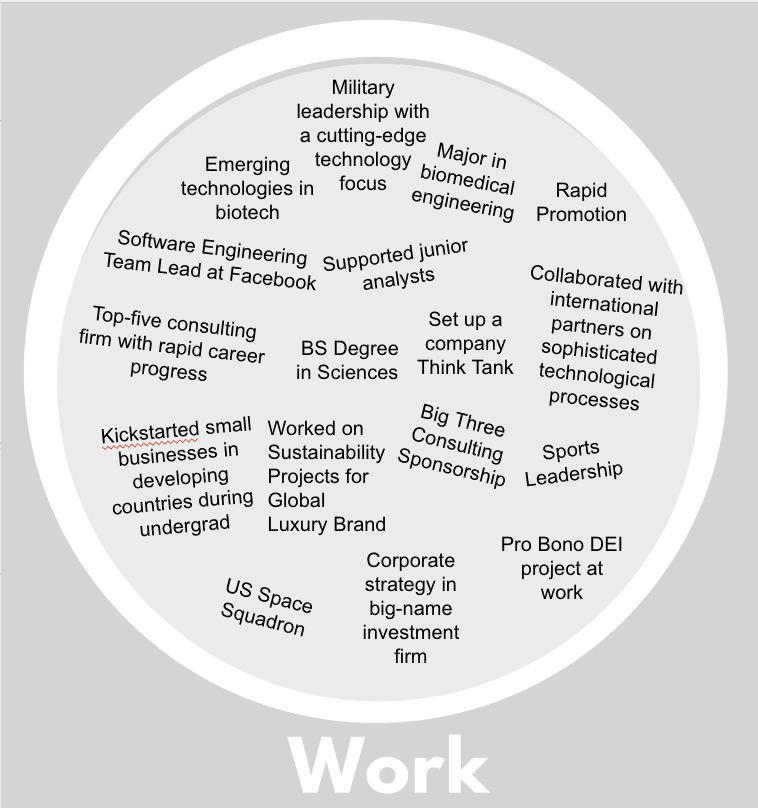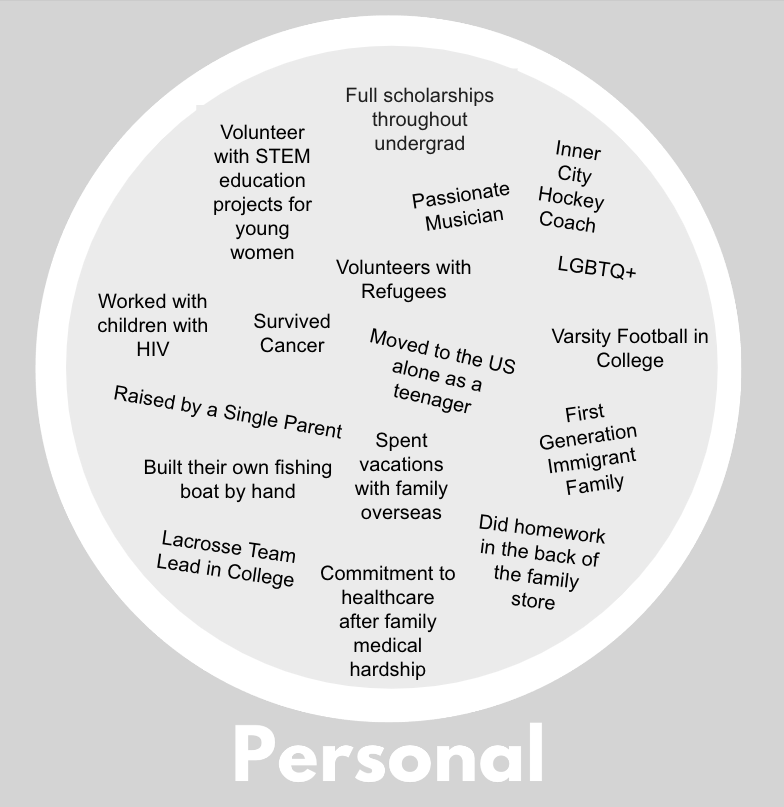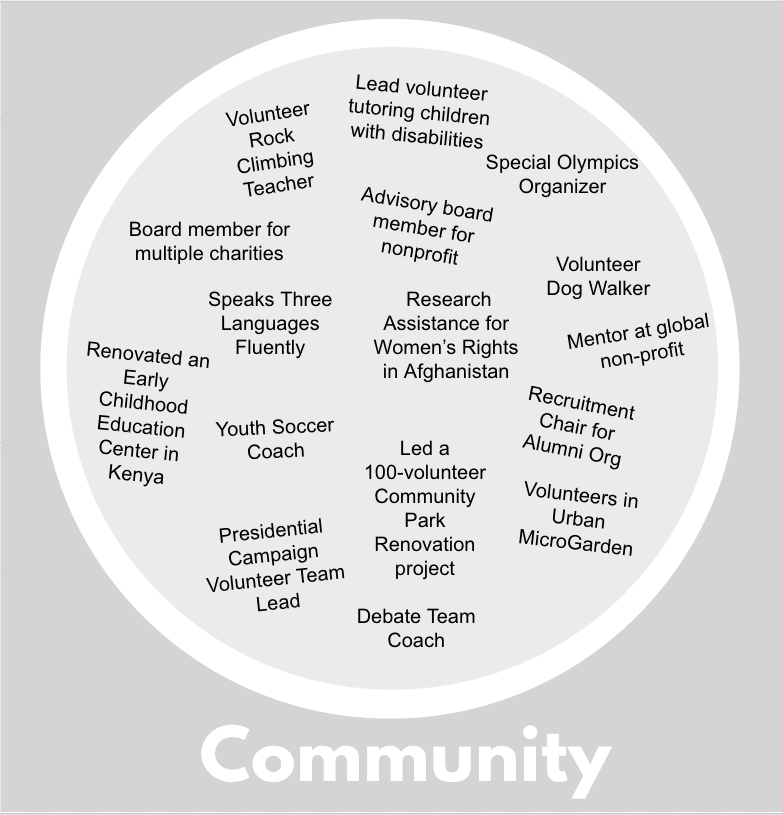Forum Home > GMAT > Quantitative > Problem Solving (PS)
Events & Promotions
| Last visit was: 31 Aug 2024, 18:53 |
It is currently 31 Aug 2024, 18:53 |

Customized
for You
Track
Your Progress
Practice
Pays
04:30 PM MDT
-09:00 AM MDT
11:00 AM SGT
-03:00 PM SGT
12:00 PM EDT
-01:00 PM EDT
09:00 PM IST
-10:00 PM IST
| FROM Stacy Blackman Consulting Blog: Register Now for the HBS Peek Program |
 Are you a college student interested in learning more about the MBA degree? Harvard Business School has just the program for you. Known as HBS Peek, this online initiative offers an insider preview of the HBS MBA program. Attendees will experience the Case Method with HBS faculty, develop their leadership skills, and craft their careers after college. “Do you think an MBA is just for ‘corporate types’? Think again!” says Dr. Jill Avery, the Faculty Chair for HBS Peek. “The Master of Business Administration (MBA) is one of the most flexible master’s degrees you can find.” “Through Peek you can explore options for your future and learn how an MBA can help you develop general management skills that you can put to use in any career and in any kind of organization – from for-profit businesses to non-profit organizations, from your own start-up to the world’s largest companies, and everything in between,” Avery explains. The next HBS Peek runs from January 25-27, 2023, and you must register by January 10, 2023. This virtual program is free and open to any college student. Register for the sessions that best fit your schedule. There will be 12 hours of programming to choose from over three days, says Avery. Participants can choose as much or as little as their schedule allows.  HBS Peek is the Perfect First Look for 2+2 Aspirants HBS Peek is an invaluable entry point for anyone considering Harvard Business School’s deferred admissions program. Chad Losee, the outgoing director of MBA admissions, has announced that the application for the 2+2 program will open on December 15, 2022, and is due April 27, 2023. This deferred admissions program targets current students in their final year of study in college or a full-time master’s degree program. Admitted applicants defer their Harvard MBA for two to four years to start their careers. Stacy Blackman Consulting has several consultants exclusively dedicated to college senior clients during the first quarter of every year. Their expertise runs deep for the deferred MBA admissions programs across our client pool. In fact, one of the founders of the HBS 2+2 program is now an in-house advisor at SBC. If you’re a college student who’s seriously eying a deferred admissions program, we can help! Let’s make sure your deferred MBA admissions plan is effective and optimized. Contact us for an initial free evaluation here. The post Register Now for the HBS Peek Program appeared first on Stacy Blackman Consulting - MBA Admissions Consulting. |
| FROM Stacy Blackman Consulting Blog: MIT Sloan Acceptance Rates, Deconstructed |
|
MIT Sloan’s 12.1% acceptance rate was the second-lowest of all MBA programs in 2021, second only to Stanford GSB and neck-and-neck with Harvard Business School. With its relatively small 450-person class size, MIT Sloan is not only one of the highest-ranked MBA programs worldwide, it’s also one of the most exclusive. In 2020, admission rates were skewed by COVID-related adjustments, giving MIT an unusual 22% acceptance rate, but acceptance rates have since settled back down to Sloan’s The appeal of MIT Sloan is multi-faceted: location is one of the school’s strengths, facilitating collaboration with Harvard’s Kennedy School and placing students and alumni right in the heart of Boston’s finance, health sciences and tech industries. MIT is naturally a go-to brand for applicants with strong tech bona-fides; however, Sloan is making great efforts to diversify its class, both in terms of industries and in terms of demographics: from 35% in 2015, women in MIT Sloan’s incoming class have increased to 46% in 2021. Moreover, the bulk of pre-MBA industries for admitted applicants include Consulting (23%) and Financial Services (23%), with Technology representing a slightly lower percentage of admits than in past years. To help demystify MIT Sloan’s acceptance rate drivers, we evaluated SBC client data from the 2021 – 2022 season. Our findings show that the admit patterns by MIT have become increasingly reliant on qualitative aspects, particularly human impact, as presented in Sloan’s unique Cover Letter format; MIT also seeks a broader range of applicant attributes, with an emphasis on data analysis skills and a demonstrated commitment to diversity, equity and inclusion. An applicant’s history of tangible achievement is a major driver for MIT Sloan. It can be even more predictive of admissions success than rigid categories such as grades or test scores. Application advice from DeeDee, former MIT Sloan admissions committee member and SBC consultant: “MIT Sloan is tech-focused and looks to solve the world’s problems in new ways. I always sensed a special something, a spark, in the candidates I recommended for admission that set them apart, it’s a sense of self not everyone has.” [b]Our process:[/b] To preserve anonymity for our client pool, we’ve deconstructed each of our client profiles across these criteria: [list] Nationality[/*] Industry[/*] Employer[/*] College[/*] GPA[/*] Test scores[/*] Other distinguishing factors[/*] [/list] Our consultants have shared client attributes for each of these criteria, and we’ve aggregated the outcomes for MIT Sloan admits according to personal, extracurricular, and professional domains. These visuals showcase the kaleidoscope of qualities found in MIT Sloan admits across a sampling of recent SBC clients. [img]https://www.stacyblackman.com/wp-content/uploads/Screen-Shot-2022-12-06-at-9.54.33-AM.png[/img] [img]https://www.stacyblackman.com/wp-content/uploads/Screen-Shot-2022-12-06-at-9.55.45-AM.png[/img] [img]https://www.stacyblackman.com/wp-content/uploads/Screen-Shot-2022-12-06-at-9.55.54-AM.png[/img] A recent MIT Sloan admit and Stacy Blackman Consulting client shared with us, [b]“[/b]Don’t get lost on a tangent, opining on your big ideas for how the world should be – that will come after school – focus on you and what you’ve done to mould the world you’re in.” She added that her SBC consultant, “helped highlight the unique elements of my personality, story, so that my goals shined through. My SBC consultant reviewed my entire application – not just the essays, but also my resume, data form, recommendation letters etc. – and squeezed out every opportunity to differentiate myself. She had a direct working style, which I appreciated, and used my time well. SBC was instrumental in getting me into MIT Sloan.” Check out our HBS and GSB dual admit study [url=https://www.stacyblackman.com/stanford-harvard-business-school-mba-applications-double-admits/]here[/url] for more inspiration. And, see [url=https://www.stacyblackman.com/blog/harvard-business-school-acceptance-rate-deconstructed/]Harvard Business School Acceptance Rate, Deconstructed[/url] and [url=https://www.stacyblackman.com/blog/stanford-mba-acceptance-rate-deconstructed/]Stanford MBA Acceptance Rate, Deconstructed.[/url] If you’d like to speak with one of our Principals about your MBA candidacy, please [url=https://www.stacyblackman.com/contact/]request a free analysis here[/url]. The post [url=https://www.stacyblackman.com/blog/mit-sloan-acceptance-rate/]MIT Sloan Acceptance Rates, Deconstructed[/url] appeared first on [url=https://www.stacyblackman.com]Stacy Blackman Consulting - MBA Admissions Consulting[/url]. |
| FROM Stacy Blackman Consulting Blog: MIT Sloan Acceptance Rate, Deconstructed |
 Clocking in at just 12.1%, the MIT Sloan acceptance rate in 2021 was the second-lowest of all MBA programs— just behind Stanford GSB and neck-and-neck with Harvard Business School. With its relatively small 450-person class size, the Sloan School of Management is one of the highest-ranked MBA programs worldwide and the most exclusive. (In 2020, COVID-related adjustments skewed admission rates, giving MIT an unusual 22% acceptance rate. But percentages have since settled back down.) The MIT Sloan School of Management has a multi-faceted appeal. Its location in the heart of Boston’s finance, health sciences, and tech industries is one of the school’s strengths, and students frequently collaborate with peers at Harvard’s Kennedy School. MIT is naturally a go-to brand for applicants with solid tech bona-fides. However, Sloan is making significant efforts to diversify its class in terms of industries and demographics. Women in MIT Sloan’s incoming class increased from 35% in 2015 to 46% in 2021. Moreover, the bulk of pre-MBA industries for admitted applicants includes consulting (23%) and financial services (23%), with technology representing a slightly lower percentage of admits than in past years. Drilling Down on the MIT Sloan Acceptance Rate To help demystify the MIT Sloan acceptance rate drivers, we evaluated SBC client data from the 2021–2022 season. Our findings show that admit patterns have increasingly relied on qualitative aspects, as seen in Sloan’s unique Cover Letter format. MIT also seeks a broader range of applicant attributes, emphasizing data analysis skills and a demonstrated commitment to diversity, equity, and inclusion. An applicant’s history of tangible achievement is a major driver for MIT Sloan. It can be even more predictive of admissions success than rigid categories such as grades or test scores. SBC consultant DeeDee, a former MIT Sloan admissions committee member, says, “MIT Sloan is tech-focused and looks to solve the world’s problems in new ways. I always sensed a special something, a spark, in the candidates I recommended for admission that set them apart. It’s a sense of self not everyone has.”  The SBC process: To preserve anonymity for our client pool, we’ve deconstructed each of our client profiles across these criteria:
   A recent MIT Sloan admit and Stacy Blackman Consulting client shared this sage advice: “Don’t get lost on a tangent, opining on your big ideas for how the world should be—that will come after school—focus on you and what you’ve done to mould the world you’re in.” She added that her SBC consultant “helped highlight the unique elements of my personality, story, so that my goals shined through. My SBC consultant reviewed my entire application—not just the essays but also my resume, data form, recommendation letters etc.—and squeezed out every opportunity to differentiate myself. She had a direct working style, which I appreciated, and used my time well. SBC was instrumental in getting me into MIT Sloan.” For more inspiration, check out our HBS and GSB dual admit study here. Also, see Harvard Business School Acceptance Rate, Deconstructed, and Stanford MBA Acceptance Rate, Deconstructed. If you’d like to speak with one of our Principals about your MBA candidacy, please request a free analysis here. The post MIT Sloan Acceptance Rate, Deconstructed appeared first on Stacy Blackman Consulting - MBA Admissions Consulting. |
| FROM Stacy Blackman Consulting Blog: B-Schooled Podcast Episode #137: Doubting Yourself? This Could Be a Good Thing (Part One) |
 Every thoughtful MBA applicant doubts themselves at some point during the MBA application journey. More critically, it is often the applicants who have the most to offer—the most unique experiences, the most diverse perspectives, the most out-of-the-ordinary life stories—who doubt themselves the most. Are you having doubts about applying? This could be a good thing. Are you having REALLY BIG DOUBTS? This could be even better. Host Chandler Arnold gets personal in this episode by sharing five specific ways to combat self-doubt during the MBA admissions process. He concludes with a framework for re-casting doubts as things you can learn from to make your application even more powerful. This is an episode not to be missed. B-Schooled podcast #137 can be found here, or take a listen on any of the major platforms below. B-Schooled is available on most major podcast apps, including: Apple Podcasts Spotify Stitcher TuneIn Please be sure to subscribe to B-Schooled so that you don’t miss a thing. Also, if there’s something you’d like for us to cover in a future episode, please email podcast@stacyblackman.com. We’d love to hear from you! Are you following us on all the socials? Stacy Blackman Consulting is now on TikTok! Hit us up @stacyblackmanconsulting to hear expert MBA admissions advice direct from Stacy and the team. The post B-Schooled Podcast Episode #137: Doubting Yourself? This Could Be a Good Thing (Part One) appeared first on Stacy Blackman Consulting - MBA Admissions Consulting. |
| FROM Stacy Blackman Consulting Blog: Behind the Scenes at HBS Admissions |
 From time to time, we like to shine a spotlight on the high-caliber professionals on the consulting team at Stacy Blackman. We’re excited to welcome aboard our newest consultant, Geri, and share insights from her time behind the scenes at HBS admissions. During her seven-year tenure at Harvard Business School, Geri evaluated applications and interviewed MBA candidates from an array of academic, geographic, and employment backgrounds. She also traveled globally, representing the school at outreach events to raise awareness for women and international students. In addition to working in MBA admissions, Geri spent time in both the Career and Professional Development Office as well as the digital education arm of HBS. We hope you enjoy this Q&A with Geri, who gave us the inside scoop on what it was like to work on the admissions team at Harvard Business School. What did you enjoy most about evaluating candidates while in HBS admissions? I had the privilege of meeting the brightest and most diverse set of people from all over the world, doing things I could never have imagined. I learned about new cultures, passions, and jobs and met people I would likely never have met under any other circumstances. The candidates were almost always dedicated, hard-working, and devoted to whatever they focused on. I was allowed an “inside” look into people’s lives—the challenges and the triumphs. I was often amazed not just by what people accomplished but by what they overcame. What was the least enjoyable aspect of the admissions role? The toughest part of the role was knowing that we would have no choice but to deny admission to a large number of extraordinarily intelligent, fascinating, and worthy people. There were simply only so many seats to go around. What type of relationships did you have with admissions officers at other M7 programs? Did you share stories, trends, etc.? The admissions teams from the M7 programs would meet a few times a year. Sometimes we would share best practices, talk about new tools (usually around application management), and review the upcoming MBA outreach events. We would certainly talk about trends we were seeing in the applicant pool (of course, only in aggregate, no names.) On an ad hoc basis, we could always reach out to our counterparts if we wanted to connect on anything. You were in the position during the surge of application volumes during an economic downturn. How did the economic downturn influence your work? How did the admissions office adapt? It was definitely a bit crazy! While the application numbers surged, the number of seats in the classes remained the same, so it certainly made it more challenging to select the class. One of the things we considered while reviewing the applications was whether or not the applicants were applying because they had limited job options or because getting an MBA was an intentional part of their larger vision. Logistically we also had to review a larger number of apps, so we had to be very good at managing our time.  Did admit decisions, such as percentage by gender, diversity, industry, nationality, function, “in the news” employers, or other variables, change over your tenure at HBS? Is it always evolving based on HBS priorities, or is it fairly similar from year to year? The class demographics certainly shift over a period of time, sometimes driven by HBS priorities. For example, based on faculty feedback (seeing a lack of flexibility in thinking from students who had been working for many years), the school began to experiment with admitting people with fewer years of work experience. This ultimately led to the 2+2 (deferred admit) program. External factors can also drive demographic shifts. Over time, some industries swing towards or away from valuing/hiring MBA grads. Additionally, some industries “get hot” for periods of time, and more people want and need an MBA to enter those industries. HBS looks for a Habit of Leadership. What were some of the memorable ways you saw leadership stand out in MBA applications during your time at HBS? The interesting thing about recognizing a “Habit of Leadership” is that it can be demonstrated in various ways. Of course, there are the more typical examples: the president of your class or the captain of your team. And those are certainly great and worthwhile. But it can also show up in less formal ways, without a title. You could have organized and managed a holiday gift drive or started a new service trip with your friends.  How about community citizenship or personal qualities? How did HBS admissions weed out the tough or arrogant personalities? This is one of the reasons that HBS began to require an interview as part of the application process. It’s really hard to hide an arrogant or entitled personality for a full 30 minutes. It would often rear its head at one point or another. One thing to note is that every school employee an applicant interacts with could have input into their candidacy. Even those that may “just” be sitting at an event table or at a reception desk. Is it much harder to stand out from oversubscribed industry pools of finance or consulting? Does it help to come from a feeder firm? It can be challenging to stand out coming from an oversubscribed industry. Given the sheer number of applications and the fact that the work experience is largely similar, it can be tough to demonstrate how you differ from someone else. On the flip side, though, you have a leg up in some ways as well. The HBS admissions board knows exactly what you do and what skills you bring to the table. You have less convincing to do on that front. They also know you made it through a rigorous application process to get the job. So, you’ve been vetted in a way. Lastly, the oversubscribed industries often make up a larger percentage of the class, so there are also more seats available for those people to fill.  Can you share any memorable examples of path-less-traveled candidates? Is it true HBS admissions loves a great story? I believe it’s true that all people, and therefore all admissions boards, love a great story. It’s a way to bring life to your application and show the realness of who you are during what can be a dry process. I recall a story of an applicant engineering a soccer ball that could be kicked around and then used to provide electricity for a short period of time. He wanted to bring this technology to underdeveloped areas in Africa. However, it’s important that the stories you tell are genuine. It can often show through when it’s been fabricated or forced. The main impetus for starting 2+2 was to attract students who would never apply to b-school. Were there any growing pains or reservations about attracting college seniors? Any issues with integrating early career students into the HBS student class once they matriculated? I was closely involved when 2+2 was launching, so I remember this time well! The main reservation was that students with only two years of work experience would not have enough to contribute to the classroom and that the classroom discussion (and their fellow students) would suffer because of it. Fortunately, this did not turn out to be the case. The 2+2 group of students are stand-outs—they are the type of people who can hold their own in the classroom. And interestingly, while we were concerned about integration, the 2+2’ers reported that their classmates didn’t even know they were 2+2!  Did you collect feedback in your role about why a candidate declined HBS for another program, such as Stanford or Wharton? Or was that very rare to see an admit decline? All the admissions teams are a bit obsessed with the declines and where they land! This info was certainly collected from the candidates. And while each school might try to address the “why’s,” it often came down to fit (the candidate has family from the region), or weather (the candidate hates the cold—that’s when we would tell them about the underground tunnel system on the HBS campus). Sometimes the decision was related to the focus of the curriculum or the job/company prospects post-graduation. And those are wise things to consider when making a decision (if you’re lucky enough to be admitted to multiple schools.) What’s the approximate percentage of applicants invited to interview, and then the percentage of interviewed candidates ultimately admitted? I don’t recall the percentage of applicants invited to interview, but typically about 60% of the interviewed candidates are admitted. So, once you get to that stage, you’re halfway home. The post Behind the Scenes at HBS Admissions appeared first on Stacy Blackman Consulting - MBA Admissions Consulting. |
| FROM Stacy Blackman Consulting Blog: How to Deal When Your Manager Leaves |
 “FRESH IDEAS FROM THE BLACKLIGHT” SBC’s Weekly Newsletter for Professionals We’re often so obsessed with our own career progression we forget that the boss can move on, too. Suddenly, you’re stressing over how your team will continue to function once the linchpin is no longer there. But it’s not just dealing with the angst and uncertainty—their exit might also cost you materially. When your manager leaves, it could impact your future pay and promotions, says Wharton professor Matthew Bidwell. He and co-authors JR Keller of Cornell and Wharton doctoral candidate Minseo Baek have published a paper exploring how managerial mobility affects the staff left behind. They decided to focus on managers, says Bidwell, “because I think for most people, they’re the single most consequential person in their career.” In a Knowledge at Wharton podcast interview, he explains the main takeaways from the study, which looked at eight years of data gleaned from a major healthcare company.  Without a doubt, the most distressing finding was that when a manager leaves, their staffer subsequently receives smaller pay raises and bonuses—and lower performance evaluations—than they would otherwise. These adverse effects were also worse for people who had worked with the same manager over many years. (They found little to no such effect on employees who had spent only a short time with a new boss.) Bidewell says the reason for this reaction is simple. “The longer I work with a manager, the better I get to know him or her. I understand what they need and how to supply it; they understand what I need and how to supply it. We work well together.” But “when we sever that connection, when the manager leaves, I have to go back to starting to build a new relationship with a new manager. That takes time, and I lose some of those benefits of the relationship when that’s happening.”  The Inertia Snaps When Your Manager Leaves While potentially stressful, this turn of events can make you reevaluate your own career trajectory. A supervisor’s departure can shake us out of our complacency. You don’t want to mess up a good thing when you’re vibing so well with your manager. Because you’re coasting comfortably, you’re not motivated to seek new challenges and opportunities. But when a new person steps into the picture, it’s an ideal time to reassess your future. A manager’s departure was also associated with people getting promoted into other groups within the organization, Bidwell notes. “When I get this kind of push — my manager is leaving and I don’t know this new person so well — then I’m more likely to think about new opportunities, and some of those could actually be things that are better for me,” he added. Your Next Steps  Do you enjoy your job and want to continue with the organization when your manager leaves? Then consider stepping up your game. Now’s the time to stretch and get out of your comfort zone. Ask for feedback about your job performance from your outbound boss (or their direct report). Offer to take some tasks off their plate while they tie up loose ends. Whether you’re angling for a promotion or just want to show the new manager you’re a team player, these savvy moves will ensure you get noticed. Huzzah! You made it to the end of the post! This post on how to deal when your manager leaves appeared initially in the Blacklight, our weekly newsletter for professionals. At the Blacklight, we aim to illuminate with every dispatch that lands in your inbox. If you’re thirsty for guidance to help you slay it at work or as a student and move your goalposts closer, sign up today! The post How to Deal When Your Manager Leaves appeared first on Stacy Blackman Consulting - MBA Admissions Consulting. |
| FROM Stacy Blackman Consulting Blog: B-Schooled Podcast Episode #138: Doubting Yourself? This Could Be a Good Thing (Part Two) |
 Are you having doubts about applying to business school? This could be a good thing. Are you having REALLY BIG DOUBTS? This could be even better. In this two-part episode of B-Schooled, host Chandler Arnold gets personal about combatting self-doubt and—more importantly—transforming this doubt into FUEL to drive you forward toward your goals. Last week we talked about five specific ways to combat self-doubt during the MBA admissions process:
You can listen to this B-Schooled episode right here or on any of the major podcast platforms below. B-Schooled is available on most major podcast apps, including: Apple Podcasts Spotify Stitcher TuneIn Please be sure to subscribe to B-Schooled so that you don’t miss a thing. Also, if there’s something you’d like for us to cover in a future episode, please email podcast@stacyblackman.com. We’d love to hear from you! Are you following us on all the socials? Stacy Blackman Consulting is now on TikTok! Hit us up @stacyblackmanconsulting to hear expert MBA admissions advice direct from Stacy and the team. The post B-Schooled Podcast Episode #138: Doubting Yourself? This Could Be a Good Thing (Part Two) appeared first on Stacy Blackman Consulting - MBA Admissions Consulting. |
| FROM Stacy Blackman Consulting Blog: 6 Last-Minute Round Two Application Tips |
 If you’re approaching the deadline for round two business school applications and feeling overwhelmed, don’t panic. While time may be running out, there are still things you can do to improve your chances of getting accepted. Here are some last-minute round two application tips to keep in mind:

The post 6 Last-Minute Round Two Application Tips appeared first on Stacy Blackman Consulting - MBA Admissions Consulting. |
| FROM Stacy Blackman Consulting Blog: Prep Tips for MBA Video Essay Questions |
 Business schools use video essay questions to get to know applicants better and assess their communication and presentation skills. A video essay allows the admissions committee to see how applicants present themselves and communicate their ideas rather than just reading about them on paper. It also allows applicants to showcase their personalities and passions more personally and authentically. A growing number of elite business schools are incorporating video essays into their applications. For example, this season, the Kellogg School of Management has introduced optional video essays that applicants can submit after uploading their application and submitting payment. Kellogg calls this component “a great opportunity to tell us more about you and explain why Kellogg is the right place for you.” Likewise, Jared Liu, senior associate director of admissions at Yale School of Management, says the video essay questions provide “a more dynamic, multi-dimensional profile of each candidate” to the AdCom. Applicants shouldn’t stress too much about the video questions. Liu says that “There are no ‘trick questions’; we are not trying to stump you.” Video essay questions can be an effective way for business schools to differentiate between candidates who may have similar backgrounds and qualifications. They can also provide insight into how an applicant thinks on their feet and handles the pressure of being on camera.  How to Prep for Video Essay Questions Overall, video essay questions give business schools a complete picture of an applicant and can be a valuable addition to the admissions process. Here are some tips on effectively presenting yourself when answering those video essay questions. Follow the prompt: Be sure to read and understand the prompt for the video essay carefully. Make sure to answer the question or address the topic thoroughly and completely. Plan your content: Before you start filming, take some time to think about what you want to include in your video. Consider your strengths, accomplishments, and what makes you unique. Write down a list of key points you want to cover and practice delivering them clearly and concisely. Choose an appropriate setting: The setting of your video should be professional and well-lit. Avoid distractions in the background, such as loud noises or cluttered spaces. Consider filming in a quiet conference room or a well-lit office. Dress for success: It’s important to dress professionally for your video, just as you would for an in-person interview. Wear a suit or dress pants and a collared shirt. Avoid wearing too much jewelry or loud patterns. Check out B-Schooled podcast episode #20: How to Ace Your Video Essays Practice your delivery: Take some time to practice delivering your content before you start filming. This will help you feel more comfortable and confident on camera. Pay attention to your body language and facial expressions, and maintain eye contact with the camera. Use a good-quality camera and microphone: A high-quality video is crucial for making a good impression. Use a camera with good resolution and a microphone that picks up your voice clearly. Avoid using your smartphone’s built-in microphone, as the audio quality may not be sufficient. It’s natural for business school applicants to feel nervous about video essay questions. Still, with proper preparation and practice, it’s possible to overcome these nerves and deliver a strong and confident performance. Following these tips, you can create a strong MBA video essay that showcases your strengths and accomplishments and sets you apart from other applicants. Good luck with your application! The post Prep Tips for MBA Video Essay Questions appeared first on Stacy Blackman Consulting - MBA Admissions Consulting. |
| FROM Stacy Blackman Consulting Blog: B-Schooled Podcast Episode #139: Advice From a Former Adcom, Part 1 |
 At Stacy Blackman Consulting, we have a team of former admission committee members from top MBA programs who serve as our “Flight Testers.” Our Flight Test mimics an actual application review, just like the adcom will do in real life. Except that you’ll be getting personalized feedback on what you can improve BEFORE you hit submit! In the first of this two-part episode series, we talk with Caryn, a former member of the Kellogg admissions committee and member of the SBC team, who shares what MBA adcoms really think about—and are looking for in—applicants’ transcripts, test scores, resumes and data forms. Listen to B-Schooled episode #139 right here, or on any of the podcast apps listed below. B-Schooled is available on most major podcast apps, including: Apple Podcasts Spotify Stitcher TuneIn Please be sure to subscribe to B-Schooled so that you don’t miss a thing. Also, if there’s something you’d like for us to cover in a future episode, please email podcast@stacyblackman.com. We’d love to hear from you! Are you following us on all the socials? Stacy Blackman Consulting is now on TikTok! Hit us up @stacyblackmanconsulting to hear expert MBA admissions advice direct from Stacy and the team. The post B-Schooled Podcast Episode #139: Advice From a Former Adcom, Part 1 appeared first on Stacy Blackman Consulting - MBA Admissions Consulting. |
| FROM Stacy Blackman Consulting Blog: MBA Applicants Should Show They’ll Contribute to the Community |
 Students at UNC Kenan-Flagler Business School Business schools attract talented, ambitious individuals who seek to advance their careers and positively impact the world. But, getting accepted into a top MBA program isn’t easy. The admissions committees look for candidates with more than just strong academic and professional backgrounds. Successful admits also fit the school’s mission and values and have the potential to contribute to the community and the learning experience of their peers. How Will You Contribute to the Community? As an MBA applicant, it’s essential to show how you can add value to the business school if accepted. Think of concrete ways beyond fulfilling course requirements and getting the degree. Focus on these areas to showcase your strengths and prove your commitment to giving back to the school. Identify your unique strengths and passions. Take time to reflect on what makes you stand out as a candidate. How can you leverage your skills, knowledge, and experiences to contribute to the program? Consider your personal and professional goals, values, and interests. Think about how they align with the school’s vision and culture. Highlight achievements demonstrating your leadership, teamwork, creativity, resilience, and other relevant qualities that can benefit the school. Research the school and its programs. Before applying to a business school, you should do your homework. Find out as much as possible about the institution, its faculty, students, alums, and opportunities. Some things to research include the school’s:
 Tailor your application to each specific business school. When preparing your MBA application, tailor your resume, essays, recommendations, and other materials to the specific business school and its programs. Show how your background and goals align with the school’s mission and values. Also, highlight how you plan to contribute to its community and learning environment. Avoid using generic or formulaic approaches. Instead, highlight your unique qualities and achievements, and use specific examples and anecdotes to illustrate your points. Engage with the business school throughout the admissions process. After submitting your MBA application, don’t just wait for the decision. Instead, take the initiative to engage with the program and signal your interest and fit. Attend events such as information sessions, webinars, or fairs. Ask questions and interact with the AdCom representatives. Also, reach out to current students and alums to learn more about the school and its programs. Doing so can showcase your curiosity, enthusiasm, and commitment to the school. At the same time, you can also learn more about the program and its expectations.  Show your potential to continue contributing after graduation. Besides demonstrating your fit and potential to contribute to the business school during the admissions process, you can also show your commitment to giving back to the school and the broader community after graduation. Consider volunteering, mentoring, or joining the alum association, and share your plans and ideas with the admissions committee. By doing so, you can signal your long-term commitment to the MBA program, its mission, and your willingness to contribute to the school’s future success and impact. Proving that you will contribute to the business school if accepted requires more than just meeting the admission requirements and having a solid resume. It involves showing your love for the program and letting the admissions committee know how you plan to enhance the learning environment for everyone. The post MBA Applicants Should Show They’ll Contribute to the Community appeared first on Stacy Blackman Consulting - MBA Admissions Consulting. |
| FROM Stacy Blackman Consulting Blog: From Tech Layoff to Business School |
 Are you one of the more than 91,000 workers recently laid off from a tech industry job? If so, you may consider pivoting to pursue an MBA degree to enhance your skills and broaden your career opportunities. In response to these mass layoffs, several business schools have rolled out the welcome mat for this cohort of professionals just in time for round 2 deadlines. Here are some things to consider to make the transition from tech layoff to business school as smooth and successful as possible. But before making any decisions, it’s important to understand why you want to pursue an MBA degree. Is it because you want to change career paths entirely or because you want to level up in the tech field? Understanding your motivations can help you choose the right program and ensure you get the most out of your management education. Request a free consultation with a Principal on the SBC team to discuss your MBA plans. From Tech Layoff to Business School There are many MBA programs to choose from, so you’ll need to do your research. Consider location, tuition, curriculum, and job placement rates. You may also want to speak with alums or current students to get a sense of the program. The following schools have made special accommodations for this group of professionals. Kellogg School of Management: Offering test waivers for laid-off tech employees for the R2 deadline only. The deadline is January 10, 2023. MIT Sloan School of Management: Offering an extended R2 deadline of February 23, 2023. Sloan will require standardized tests and is for anyone who recently experienced a layoff—not only from the tech sector. UC Berkeley Haas School of Business: Will waive the application fee for anyone laid off in the past six months, regardless of industry. Haas will also extend the deadline for these candidates until February 2, 2023. IU Kelley School of Business: Will waive the application fee for laid-off professionals and offer the opportunity to waive the GMAT/GRE requirement, too. The R2 deadline is January 5, 2023.  Highlight Those Transferable Skills Applying to an MBA program can be competitive, so you’ll want to put your best foot forward. Fortunately, tech workers have a range of transferable skills that can be highlighted when applying to business school. These include:
 By playing up transferable skills in your application, you can demonstrate to business schools that you have the experience necessary to succeed in their program. While you might feel glum about your current employment status, know that MBA admissions representatives value resilience and character. So, explain your layoff situation with sincerity and transparency. Remember, even though you’ve experienced a job loss, you’ve still likely had many career successes, too. Shine the spotlight on those aspects in your application, and show how they have prepared you for this exciting new chapter in your career. Good luck! The post From Tech Layoff to Business School appeared first on Stacy Blackman Consulting - MBA Admissions Consulting. |
| FROM Stacy Blackman Consulting Blog: B-Schooled Podcast Episode #140: Advice From a Former Adcom, Part 2 |
 As we mentioned last week, a unique aspect of our admissions-consulting process at Stacy Blackman Consulting is our Flight Test, which replicates an actual admissions committee review of your entire application package. We have a team of former admission officers from top MBA programs who serve as our Flight Testers, and this week we wrap up our two-episode conversation with one of them: Caryn, who served as a Kellogg admissions committee member. In Part 2, Caryn reveals how MBA adcoms judge candidates’ essays, recommendation letters, extracurriculars, and leadership. B-Schooled episode #140 can be found below, or on any major podcast app. B-Schooled is available on most major podcast apps, including: Apple Podcasts Spotify Stitcher TuneIn Please be sure to subscribe to B-Schooled so that you don’t miss a thing. Also, if there’s something you’d like for us to cover in a future episode, please email podcast@stacyblackman.com. We’d love to hear from you! Are you following us on all the socials? Stacy Blackman Consulting is now on TikTok! Hit us up @stacyblackmanconsulting to hear expert MBA admissions advice direct from Stacy and the team. The post B-Schooled Podcast Episode #140: Advice From a Former Adcom, Part 2 appeared first on Stacy Blackman Consulting - MBA Admissions Consulting. |
| FROM Stacy Blackman Consulting Blog: New Year’s Resolutions for MBA Applicants |
|
[img]https://www.stacyblackman.com/wp-content/uploads/resolutions-tim-mossholder-ZfaSlIdR9Q0-unsplash-1536x1024-1-1500x1000.jpg[/img] Making a list of New Year’s resolutions for 2023 can be a powerful exercise for future b-school aspirants. They can help you stay motivated and committed, build new habits, and seek support and accountability as you pursue your ambitious career goals. The following New Year’s resolutions for MBA applicants offer a stress-reducing roadmap to guide your journey for the exciting year ahead. 8 New Year’s Resolutions for MBA Applicants [b]1. Create a robust action plan. [/b] As an MBA applicant, you will likely have a lot on your plate, including preparing for the GMAT or GRE, completing your application, and working full-time. Creating an action plan that effectively balances all these tasks is vital. Consider setting aside specific times each week for studying, and try to stick to a consistent routine. The amount of time MBA aspirants will spend on their applications will vary, depending on writing abilities and general work efficiency. That said, plan to spend between 40-60 hours preparing four to eight applications. Non-native English speakers will likely need to allot more time to their applications, particularly writing, revising, editing, proofing, formatting, and inputting essays. [b]2. Improve your time management skills. [/b] Along with having a solid study plan, it is also essential to have good time management skills. That way, you can stay organized and on top of your tasks. This may involve setting goals for each day or week, prioritizing your to-do list, and learning to say no to non-essential commitments. [img]https://www.stacyblackman.com/wp-content/uploads/calendar-towfiqu-barbhuiya-bwOAixLG0uc-unsplash-1024x683-2.jpg[/img] Different folks have different sorts of work patterns. Some are most efficient when they can break up tasks into manageable pieces. Others work best when they can devote eight hours to marathon writing sessions. MBA applicants should be aware of how they work effectively and efficiently and structure their writing/editing sessions accordingly. If you’re a procrastinator, check out these [url=https://theblacklight.co/2022/06/09/fight-procrastination-with-these-three-easy-tricks/]tricks to improve your time management[/url] skills from SBC’s [url=https://theblacklight.co/]the Blacklight[/url], our weekly newsletter for professionals. [b]3. Prepare for the GMAT or GRE. [/b] The GMAT or GRE is an integral part of the MBA application process. Preparing for these exams takes considerable time and effort. Start by familiarizing yourself with the exam format and content. Consider signing up for a prep course or working with a tutor to help you reach your target score. SBC’s [url=https://www.stacyblackman.com/testprep/]test prep experts[/url] can work with you to recognize your individual learning style, discover flaws in your foundation knowledge, and set manageable yet ambitious goals. The earlier you can complete this component of your MBA application requirements, the happier you’ll be. [b]4. Research MBA programs. [/b] Not all MBA programs are created equal. Your mission is to find a program that aligns with your career goals and interests. As you begin your research, consider factors such as location, curriculum, cost, and reputation. Make sure you understand your criteria and preferences to take your business school selection past the level of rankings. [img]https://www.stacyblackman.com/wp-content/uploads/pexels-quintin-gellar-313782-1500x1000.jpg[/img] Do you want to be in the city or a rural setting? What type of coursework most interests you? Do you prefer a close-knit class or an extensive network? Do you need to be near a particular location for personal or professional reasons? Once you have [url=https://www.stacyblackman.com/blog/4-fail-safe-ways-to-research-mba-programs/]found the schools that appeal to you[/url], you can filter those down to the select few where you will ultimately apply. [b]5. Build your MBA resume. [/b] Your resume is often the first thing that MBA admissions committees will see. So, you’ll want to make a strong impression. Make sure to highlight your relevant skills, experience, and accomplishments, and tailor your application materials to the specific MBA program for which you are applying. Business school applicants often find it helpful to frame their accomplishments using the STAR method. That stands for situation, task, action, and result. For each employment position listed on your resume, think of a project, initiative, or transaction where you made a meaningful contribution. Then describe the situation, your task, your actions, and the results. Leadership skills are a top priority for elite business schools. If you need to find ways to bolster leadership examples for your resume, check out this [url=https://www.stacyblackman.com/blog/showing-leadership-in-your-b-school-application/]SBC post[/url]. [b]6. Seek feedback on your application. [/b] As you work on your MBA application in the summer and early fall, you’ll want to seek input from others. This might include asking a friend or mentor to review your resume and essays. Someone new looking at your essays and data forms may more easily spot a typo, missing word, or that extra period at the end of a sentence. [img]https://www.stacyblackman.com/wp-content/uploads/Feedback-pexels-ann-h-6732757-1024x683-1.jpg[/img] Some additional areas to go over with your reviewer could include: [list] [*]Can you clearly identify my career goals?[/*] [*]Are my reasons for wanting an MBA sound?[/*] [*]Do you see any weaknesses in my application?[/*] [/list] Or, go a step beyond and engage [url=https://www.stacyblackman.com/blog/is-an-mba-worth-it-heres-your-checklist/]an SBC admissions consultant[/url] to expertly guide your application strategy. [b]7. Practice your interview skills. [/b] The MBA interview process can be intimidating. But it is also an opportunity to showcase your ability to think on your feet. While interviews are the final stage of the admissions review process, it’s never too early to start getting comfortable with them. Start practicing your interview skills by conducting mock interviews with friends or career advisors, and be sure to research the MBA program beforehand to have informed responses to potential questions. We recently covered MBA interviews on SBC’s B-Schooled podcast. Take a listen to [url=https://www.stacyblackman.com/blog/b-schooled-podcast-episode-135-mba-interview-advice-part-2-of-2/]Episode #135[/url] for killer tips. [img]https://www.stacyblackman.com/wp-content/uploads/pexels-maik-kleinert-3576284-1500x1000.jpg[/img] [b]8. Stay positive and focused. [/b] The MBA application process can sometimes be stressful. Maintaining a healthy work-life balance is vital for staying motivated and energized. These New Year’s resolutions for MBA applicants can be a helpful way to focus on specific areas of improvement, stay motivated and committed, build new habits, and seek support and accountability as you pursue your career goals. *** Thank you for making Stacy Blackman Consulting a top destination for your b-school research. We hope this resource continues to serve you well as you embark on what is definitely a life-changing, career-boosting journey. Have a wonderful holiday, and see you back here in 2023! The post [url=https://www.stacyblackman.com/blog/new-years-resolutions-for-mba-applicants/]New Year’s Resolutions for MBA Applicants[/url] appeared first on [url=https://www.stacyblackman.com]Stacy Blackman Consulting - MBA Admissions Consulting[/url]. |
| FROM Stacy Blackman Consulting Blog: B-Schooled Podcast Episode #141: 10 Things to Do Before Submitting Your Application |
 This B-Schooled podcast gives applicants ten things to think about in the days before submitting their applications. Mind you, this is not intended as something to listen to an hour before you submit. But it does offer incredibly useful information to think about a day or two before the application deadline. As we always say, you want an application that is authentic, bold and offers a clear and consistent narrative. You want this narrative to come across cohesively via all elements of your application: your essays, your resume, your recommendations, and your interviews. To help set you up for success, today we offer ten suggestions touching on the following topics:
B-Schooled is available on most major podcast apps, including: Apple Podcasts Spotify Stitcher TuneIn Please be sure to subscribe to B-Schooled so that you don’t miss a thing. Also, if there’s something you’d like for us to cover in a future episode, please email podcast@stacyblackman.com. We’d love to hear from you! Are you following us on all the socials? Stacy Blackman Consulting is now on TikTok! Hit us up @stacyblackmanconsulting to hear expert MBA admissions advice direct from Stacy and the team. The post B-Schooled Podcast Episode #141: 10 Things to Do Before Submitting Your Application appeared first on Stacy Blackman Consulting - MBA Admissions Consulting. |
| FROM Stacy Blackman Consulting Blog: Debunking the Top 5 MBA Interview Myths |
 For B-school hopefuls putting the finishing touches on their round two applications, the next step in the process is preparing for the MBA interview. Some schools are notorious for putting candidates through a grueling exchange (we’re looking at you, Harvard Business School). Most interviews are probing conversations about your background and experiences. Preparation is key, so get started by putting your mind at ease regarding these common yet erroneous MBA interview myths. The Top 5 MBA Interview Myths Myth #1: The MBA interview is a one-way street. One of the biggest misconceptions about the MBA interview is that it’s a one-way street, with the interviewer asking all the questions and the applicant answering them. In reality, the MBA interview is an opportunity for the interviewer and the applicant to learn more about each other. That’s why it’s essential that applicants engage in a genuine dialogue with the interviewer. An MBA interview is an ideal opportunity to learn more about the program beyond what you glean from the website. Make sure to prepare a few smart questions in advance to ask the interviewer. Myth #2: The MBA interview is all about your resume. While your resume is undoubtedly an important part of the MBA application process, it’s not the only thing that matters. The MBA interview is a chance to convey your personality, leadership skills and fit with the school’s culture. Prepare for the interview by thinking about how you can showcase your strengths and experiences rather than regurgitating your resume.  Myth #3: You need to have all the answers. It’s natural to feel a little nervous during the MBA interview. But it’s important to remember that you don’t need to have all the answers. In fact, it’s often more impressive when an applicant can admit when they don’t know something and then show how they would go about finding the answer. This is an ideal scenario to display your problem-solving skills and ability to think on your feet. Myth #4: You should always say what the interviewer wants to hear. Being respectful and courteous during the MBA interview is obviously important. But you shouldn’t feel as though you need to tell the interviewer what you imagine they want to hear. In fact, it’s more impressive when an applicant is passionate and authentic, even if their opinions differ from the interviewer’s. So, be true to yourself and don’t shy away from sharing your sincere beliefs and ideas.  Myth #5: The MBA interview is the only thing that matters. While the MBA interview is an integral part of the application process, it’s not the only thing that matters. Admissions committees take a holistic approach to evaluating applicants. That means considering factors such as GPA, work experience, essays, and recommendation letters in addition to the interview. Putting your best foot forward in all aspects of the application process is essential, rather than placing too much emphasis on the MBA interview. In the end, if you prepare thoroughly and come prepared for a lively conversation, you should pass this hurdle with no trouble at all. Good luck! *** We hope debunking these common MBA interview myths has helped ease your nerves about what awaits. If you’d like expert assistance to help you prepare for your interviews, SBC offers an MBA interview coaching service. Contact us today to learn more. The post Debunking the Top 5 MBA Interview Myths appeared first on Stacy Blackman Consulting - MBA Admissions Consulting. |
| FROM Stacy Blackman Consulting Blog: Will a Social Impact MBA Help You Reach Your Career Goals? |
 The MBA degree has long been a stepping stone for careers in consulting and finance. Yet, in recent years, we’ve seen a shift towards using the MBA as a force for social good. That’s why in 2021, we launched the Social Impact Accelerator package designed just for purpose-driven applicants. Are you wondering whether you can reach your career goals faster with a social impact MBA? Here are some reasons why more professionals are considering this type of degree to advance their social sector careers. For starters, there’s a growing recognition of the role companies can play in addressing social and environmental issues. The business world has both the resources and expertise to impact areas such as climate change, inequality, and access to education and healthcare.  Where Can You Get a Social Impact MBA? Many MBA programs now offer courses and concentrations in how to use business as a force for good. For example, the Yale School of Management includes material related to social and environmental issues in all courses in the MBA core. In fact, every initiative at the school considers how business and market forces can improve the world. At the UC Berkeley Haas School of Business, students find a substantial list of social impact coursework and experiential learning opportunities they need to prepare for careers in CSR, nonprofit and public leadership, or social entrepreneurship. Meanwhile, at the NYU Stern School of Business, students can pick up to three focus areas in social enterprise and choose from a pool of over 200 electives in areas such as social entrepreneurship, venture philanthropy, and corporate social responsibility. In short, all of the top business schools can prepare applicants through a social impact MBA. MBA graduates are trained in problem-solving and decision-making, which are desirable skills in the social impact sector. They also can understand and manage the financial and operational aspects of organizations, which is crucial for sustainability and scalability.  Plus, the MBA provides a network of like-minded individuals who are also passionate about making a difference. MBA programs often have a strong sense of community and offer opportunities for students to collaborate on social impact projects. These experiences can lead to long-term collaborations and partnerships that have a lasting impact. Finally, the MBA can provide the necessary skills and experience to transition into leadership roles in the social impact sector. Many social impact organizations look for leaders with solid business backgrounds who bring a data-driven approach to their work. The MBA degree provides the skills and experience needed to take on these roles and drive organizational change. Now more than ever, the social impact MBA is a great way to confront some of society’s most pressing issues. As more professionals seek careers in these fields, the MBA degree will continue to be a valuable tool for making a difference in the world. The post Will a Social Impact MBA Help You Reach Your Career Goals? appeared first on Stacy Blackman Consulting - MBA Admissions Consulting. |
| FROM Stacy Blackman Consulting Blog: Think About Your Purpose in Life |
|
[img]https://www.stacyblackman.com/wp-content/uploads/justin-luebke-BkkVcWUgwEk-unsplash-1500x1000.jpg[/img] Before applying to business school, it can be helpful to think about your purpose in life and how that aligns with your future career goals. As a prospective MBA, you’ll benefit enormously from taking time at the beginning of your application process to contemplate the path you’re about to take. Now is the moment to ask yourself critical questions, as self-evaluation and reflection are crucial to any MBA application journey. In a recent MBA Voices post, Harvard Business School [url=https://www.hbs.edu/mba/blog/post/thinking-about-an-mba-think-about-your-purpose]professor Ranjay Gulati[/url] says many of his students look to the MBA to gain the tools they need to solve today’s complex challenges. “I have found that my most successful students are also guided by a personal sense of purpose,” he adds. “Their unique personal narratives – combined with a strong moral compass – clarify which direction they want to take in their MBA studies.” Thankfully, you don’t need to go into full monk mode as you contemplate the bigger picture. Try the following thought exercises before you get serious about applying to business school. [img]https://www.stacyblackman.com/wp-content/uploads/pexels-maik-kleinert-3576284-1500x1000.jpg[/img] Uncovering Your Purpose in Life as an MBA Applicant [b]Reflect on your values. [/b]Take time to think about what matters most. What are your core values and beliefs? How will you stay true to them throughout your life? Your values can be a source of inspiration and help guide your choices, including your decision to pursue an MBA. Several top schools tap directly into applicants’ values in their MBA essays. For example, Stanford has asked, “What matters most to you, and why?” for years. Meanwhile, Kellogg School of Management notes that values are what guide us in life and work. This year Kellogg asks applicants, “What values are important to you and how have they influenced you?” [b]Consider long-term goals. [/b]Think about what you want to achieve long term. Do you want to make a positive impact on the world, start a business, or climb the corporate ladder? Having a clear vision for your future can give you direction and focus as you pursue your MBA. “Certain career choices and job opportunities are more lucrative and ensure financial stability,” says [url=https://www.linkedin.com/pulse/how-align-your-career-core-values-happier-elizabeth-houghton/]career coach Elizabeth Houghton[/url] on LinkedIn. “However, if they contradict your core values, you may find yourself feeling like a fish out of water with your work.” [b]Find opportunities to align your purpose with your career. [/b]When considering your MBA options, look for programs that will help you match those goals with an actual job. This ensures that you pursue a meaningful yet realistic path. As we explored [url=https://www.stacyblackman.com/blog/career-goals-social-impact-mba/]last week[/url], there’s growing recognition of the role companies can play in addressing social and environmental issues. “In my classes I show how it is entirely possible to build a business that both makes a profit and improves the lives of all its stakeholders, including society as a whole,” Gulati says. Find Your Yoda [img]https://www.stacyblackman.com/wp-content/uploads/image-from-rawpixel-id-5941941-original-1500x1000.jpg[/img] [b]Seek mentors and role models. [/b]Find people who are living out their values and ask them for guidance. They can be a powerful resource showing you how to align your purpose with your long-term career goals. Sometimes, we need help visualizing the next steps we need to take to reach those important milestones. By finding someone already in that position, we have a clearer picture of what a purpose-driven career looks like—and how to get there. [b]Don’t be afraid to pivot. [/b]Your life’s purpose may evolve over time. Feel free to change course if your current path or company no longer gels with your principles or long-term goals. “Ask yourself whether the values you have match the values of this company,” says [url=https://insight.kellogg.northwestern.edu/article/career-pivot-3-things-to-consider]Ellen Taaffe[/url] of the Kellogg School. “How do they show up in behaviors and not simply signs in the lobby?” Taaffe notes that the pandemic pressured many companies to walk the talk on issues such as climate change and racial and gender equality. We hope these suggestions have started you on the path of self-reflection that’s so vital for business school aspirants. Having a clear sense of purpose can keep you motivated and focused, help you make decisions aligned with your values and long-term goals, and set you up for success as you pursue your MBA and beyond. The post [url=https://www.stacyblackman.com/blog/think-about-your-purpose-in-life/]Think About Your Purpose in Life[/url] appeared first on [url=https://www.stacyblackman.com]Stacy Blackman Consulting - MBA Admissions Consulting[/url]. |
| FROM Stacy Blackman Consulting Blog: When Your Boss Tries to Friend or Follow You |
 “FRESH IDEAS FROM THE BLACKLIGHT” SBC’s Weekly Newsletter for Professionals It’s time to tackle yet another digital dilemma facing today’s professionals. If it hasn’t happened to you yet, it surely will at some point. We’re talking about that awkward moment when your boss tries to friend or follow you on social media. Maintaining healthy boundaries between work and home life is essential. Sure, bringing your authentic self to the office is in vogue right now. But there’s a limit to how much we feel comfortable sharing with our superiors. If they start following you online, you might feel the need to start censoring your posts. Does your boss really need to see the antics that followed your bottomless mimosa brunch? What about those “Is it 5 o’clock yet?” memes you can’t resist sharing? Even if your online activity is very PG, having your manager see posts of what you do off the clock is—for many employees—mega cringe. To get to the bottom of this online etiquette issue, we turn first to a new study co-authored by Wharton School Deputy Dean Nancy Rothbard. In a chat with the Wharton Business Daily podcast, Rothbard discusses findings from the paper, “OMG! My Boss Just Friended Me.”  “There’s a tension that people have between this exhortation to bring your whole self to work, to connect, to be a part of things, but also to keep a separation between your personal and your professional life,” she explains. Sharing With the Boss vs. With Colleagues Through various studies, Rothbard and her co-authors, Lakshmi Ramarajan of Harvard Business School; Ariane Ollier-Malaterre of the University of Quebec; and Wharton doctoral candidate Serenity S. Lee, discovered a range of reactions to work boundaries on social media. While many respondents felt okay about befriending co-workers online, the responses were notably chillier when a supervisor initiated the connection. Some considered such requests flat-out creepy. Others felt that having their manager follow them on social media felt like being spied on after hours. Still others expressed concern about how those online ties could affect their professional prospects. “It was nice to feel like they wanted to get to know me more,” said a 34-year-old male digital operations manager. “But at the same time, it was my boss, who had power over my career.” “People in general were leery of connecting with their bosses. They were more uncomfortable with a boss than with a peer,” says Rothbard. “They were also somewhat uncomfortable connecting with subordinates, so that hierarchical distinction was a bright line that people worried about crossing, although there was more concern with connecting with a boss.”  Practical Tips for When Your Boss Tries to Friend or Follow You The consensus is that having social media boundaries between managers and the people they oversee is usually a good thing. So, how should you respond when your supervisor feels differently? Thankfully, you have a few options when your boss tries to friend or follow you on Instagram, Facebook, or Twitter. Try one of these on for size. Scenario 1: the Facebook friend request. This one is relatively easy. It may sound like a copout, but we’d argue that you can safely ignore the request. In most cases, your boss won’t straight up ask why you haven’t accepted them. But if they do, you can claim you rarely use Facebook these days and didn’t see the request. If they persist, you can say, “I only use Facebook to keep in touch with my family and childhood friends. I hope you understand.” If that doesn’t end the conversation, you have more serious boundary issues to contend with.  Scenario 2: the Instagram follow. Is your account set to private? Before declining their request, send a friendly message to your boss to let them know that your Insta is for family and friends only. You could then offer to connect with them on a more professional network like LinkedIn. If anyone can follow your account, things get a bit trickier. “What you’re disclosing on that site can have implications for [the employer’s] view of you because it’s unfiltered and they don’t have context to put it in,” Rothbard explains. In that case, you can use the “close friends” option to share your NSFW stories with a subsection of followers. Another option is to have a private account for friends and have a second, more public social media page for everyone else. This is a terrific alternative as your career grows and social media use changes.  Scenario 3: the Twitter follow. Regular readers might suspect that we advocate a different approach when it comes to Twitter. That’s because this platform focuses less on personal relationships and offers a unique opportunity to showcase your professional strengths in a way that could advance your career. Pruning your profile to make it more work-friendly, or creating a separate account that bolsters your brand, is worth considering. If you’re worried about how some of your “weirder” posts come off, you can always go the route of adding a disclaimer to your profile. Try something like, “Tweets are my own and should never be taken seriously.” But, as with any social media profile, Rothbard warns, “You have to be really careful about disclosing some things so that you’re seen as more human and relatable, but perhaps not disclosing things that are TMI.” It might feel awkward to shut it down when your boss tries to friend or follow you online. But you’re under no obligation to comingle your professional and private lives. Whether their reasons are purely out of friendly curiosity or a nefarious desire to spy on your downtime, know that you have every right to keep the boss out of your feed and off your timeline. Huzzah! You made it to the end of the post! This post on how to handle follow requests from your boss appeared initially in the Blacklight, our weekly newsletter for professionals. At the Blacklight, we aim to illuminate with every dispatch that lands in your inbox. If you’re thirsty for guidance to help you slay it at work or as a student and move your goalposts closer, sign up today! The post When Your Boss Tries to Friend or Follow You appeared first on Stacy Blackman Consulting - MBA Admissions Consulting. |
| FROM Stacy Blackman Consulting Blog: The Scoop on Deferred MBA Admissions |
 Are you a college senior who is thinking about attending a top business school in the future? Then today’s post is for you! A growing number of business schools have created programs that target younger applicants through deferred MBA admissions. Read on to learn more about this exciting alternative route to b-school.
Deferred programs are for college students who haven’t held a full-time job upon application submission. The most common model for deferred MBA admissions programs is to apply as a college senior (undergrad or grad), gain an admit, and then work for two to four years before starting the program. Throughout the deferral period, MBA program admits can access valuable networks and engage career resources within the university. Without a doubt, the most coveted deferred MBA admissions program for SBC clients is the HBS 2+2 Program. With this model, successful admits work for two years upon college graduation, and then attend HBS for two years–hence the program name, “2+2.” Note that HBS can approve a third year of deferral if the candidate is working on something reasonable—not laying on a beach in Bali!  What do deferred MBA programs look for in applicants? Our SBC team includes many deferred MBA program experts. In fact, it includes two former HBS Admissions Officers who helped launch the 2+2 Program. Geri, a former HBS Admissions Officer who now works on the SBC team shared, “I was closely involved when 2+2 was launching, so I remember this time well. The HBS class demographics certainly shift over a period of time, sometimes driven by HBS priorities. For example, based on faculty feedback (seeing a lack of flexibility in thinking from students who had been working for many years), the school began to experiment with admitting people with fewer years of work experience. This ultimately led to the 2+2 (deferred admit) program.” Another former HBS Admissions Officer and SBC consultant clarified, “The main impetus for starting HBS 2+2 was to attract students who would never apply to b-school. They are looking for all the same qualities and credentials as they do for the regular pool. But, then they are also looking for scientists, engineers, techies, and entrepreneurs, to name a few. HBS really hoped they would find young people who saw the deferred admission as an opportunity to take a risk and do something a little bit off the beaten path.” Our successful college senior applicants are those who have shown leadership and made a noteworthy impact in some way. Also, they are often outside of the typical or traditional MBA candidate profile. For example, we worked with an HBS 2+2 applicant who graduated college early to take an internship working on the heroin epidemic in Washington D.C. In addition, deferred MBA admissions admits usually have clear career plans and already know how a business education will aid their aspirations. They don’t need to be 100% married to a job or industry, of course. But they do understand what community they want to serve or problems they want to tackle in the short term. Deferred admissions admits think of the MBA program as a way to build and test hypotheses and access vital networks to move them forward along an already-defined path. A solid framework on where the MBA falls along with the master plan is important for success as a deferred admissions candidate. Geri, the former HBS Admissions Officer on our SBC team, added, “The main reservation was that students with only two years of work experience would not have enough to contribute to the classroom and that the classroom discussion (and their fellow students) would suffer because of it. Fortunately, this did not turn out to be the case. The 2+2 group of students are stand-outs—they are the type of people who can hold their own in the classroom. And interestingly, while we were concerned about integration, the 2+2’ers reported that their classmates didn’t even know they were 2+2!” (Read: HBS 2+2 Deferred MBA Program: Get Accepted) But it’s not a program for everyone. On the other hand, there are some for whom deferred admissions may not be the right plan. MBA applicants who have a tougher time with admit success at the college senior level are the “explorers,” or those who still want to try different things, such as taking a few years at a broad-based employment path, to assess if the MBA is right. We can improve your MBA profile and boost your candidacy. Gain insight into the review process and eliminate weaknesses from your MBA application. Note: You must have javascript enabled to submit the form. Schedule Your Free Advising Session Stanford’s deferred MBA admissions program shared: “The great thing about deferred MBA programs is that you get access to an amazing network of the most interesting, smart people you’ll ever meet years before you even start your MBA. So, connecting with these people early on has enabled me to jump start that self-reflection process by learning from others. That’s a huge benefit of the deferred programs that I think isn’t talked about enough.” A deferred admissions admit enjoys being part of the MBA community for more years than a traditional MBA admit. These individuals have about four years from admission to graduation to explore the business school experience in depth. MBA programs often offer check-ins with deferred admissions admits such as in November of each year. At that time, the admit can let the MBA program know when he or she expects to matriculate. Plus, they have the same access to scholarship opportunities because of this check-in process. Hear from our successful deferred MBA admissions clients. A recent HBS 2+2 admit and a client of SBC wrote in to say: “Being a 2+2 admit means you are a part of the larger 2+2 community, which includes both current admits (for multiple years, since admits can defer for 2-4 years) and past 2+2 alumni. One of the first admit events HBS hosted was a panel with previous 2+2 students, and we had the opportunity to hear their stories and ask them questions directly. You are also invited to other quarterly events such as networking events and mock cases that are exclusive to 2+2ers.”  A recent HBS 2+2 admit, who worked comprehensively with SBC, discussed the benefits of the application process this way: “…definitely don’t NOT apply because you feel like you’re not qualified enough. I can’t believe that I could have missed out on getting admitted to HBS 2+2, had I let my initial self-doubts get the best of me. One thing that helped give me an extra boost of confidence to apply was telling myself that even just the application process itself was a tremendous growth opportunity – a chance to reflect and figure out what my future goals are. And it truly was an awesome experience – I feel like a different, more self-aware person now than before I applied, and in the end, it worked out well!” We can improve your MBA profile and boost your candidacy. Gain insight into the review process and eliminate weaknesses from your MBA application. Note: You must have javascript enabled to submit the form. Schedule Your Free Advising Session Harvard 2+2 ProgramYes24April 27, 20232008 Wharton Deferred Admission ProgramYes24April 26, 20232019 Stanford GSB Deferred EnrollmentBoth deferred and direct matriculation optionsFlexibleFlexibleApril 11, 20232010 MIT Sloan Deferred Admission for College StudentsYes25April 19, 20232019 Chicago Booth Scholars ProgramYes24April 11, 20232019 Chicago Business Fellows ProgramDirect, Part-Time MBA03March 27, 20232018 Darden Future Year Scholars ProgramYes24Round 1 April 11, 2023; Round 2 August 1, 20232016 Yale Silver Scholars ProgramNo00April 11, 20232004 CBS Deferred Enrollment ProgramYes25Rolling until April 15, 20232018  Timing is Everything This HBS 2+2 admit also sees that the deferred MBA application timing can be optimal over the regular application cycle: “The good news is, AdCom understands that you are a college student and they don’t expect you to have the same level of accomplishments as someone who’s been out of college for a couple of years. In the regular rounds, the applicants might have had a bit more of a blank canvas to start out with and a greater variety of experiences that they can talk about, but that also means the standard is higher.” We also hear that there’s peace of mind in securing admission early. As one client shared: “One of my personal tenets in life is “frontloading is key”, so securing early admission to a program was right up my alley (so I don’t have to worry about admissions once later on).” Along those lines, the HBS MBA Voices blog shares the journey of Nikki Philip, a 2+2 admit who planned on working in a remote village in Kenya during those interim years. “Applying to HBS via the 2+2 deferred admissions process allowed me to take the GMAT, apply to HBS, and receive my acceptance all before moving to Kenya after graduation,” she explained. Should I apply now or wait for the regular process in 2-4 years? It’s important to assess the tradeoff of applying as a college senior versus waiting until the regular application round. The deferred MBA admissions route isn’t a side door or easier route into MBA programs. A quality application effort takes a lot of time and diligence as well as application fees. An admit offer comes with the expectation that the applicant will pay the deposit to hold the deferred admit spot. A true intention of following through on that acceptance and matriculating in two years is essential. Apply only if you are sure you will accept, pay the deposit, and matriculate in a few years. What if I don’t get in? We are often asked if MBA programs will consider the applicant to be a ‘reapplicant’ if they were dinged from the MBA program at the college senior level, two to four years earlier. Should you apply a few years into your career, the admissions committee typically won’t view you as a ‘reapplicant’ and your college senior submission won’t be considered. Accordingly, there’s no downside to trying to apply as a college senior. We have counseled many clients about the tradeoffs of applying based on their specific career paths. We often see scenarios where it’s actually more favorable to apply as a college senior because the client’s admit odds are better now. In other words, the applicant will get admitted to a higher-ranked or better brand MBA program than if that applicant waited two to four years. Of course, this scenario is nuanced and shaped by career direction, demographics, and other attributes. Let’s make sure your deferred MBA admissions plan is effective and optimized. Contact us for an initial free evaluation here. Visit the HBS 2+2 Program overview here. Check out our How to Get into HBS 2+2 overview here. Read an interview with a successful Stanford GSB deferred MBA admissions client here. An interview with a successful HBS 2+2 deferred MBA admissions client is here. Finally, you can find additional college senior tips by SBC here. The post The Scoop on Deferred MBA Admissions appeared first on Stacy Blackman Consulting - MBA Admissions Consulting. |

|
|